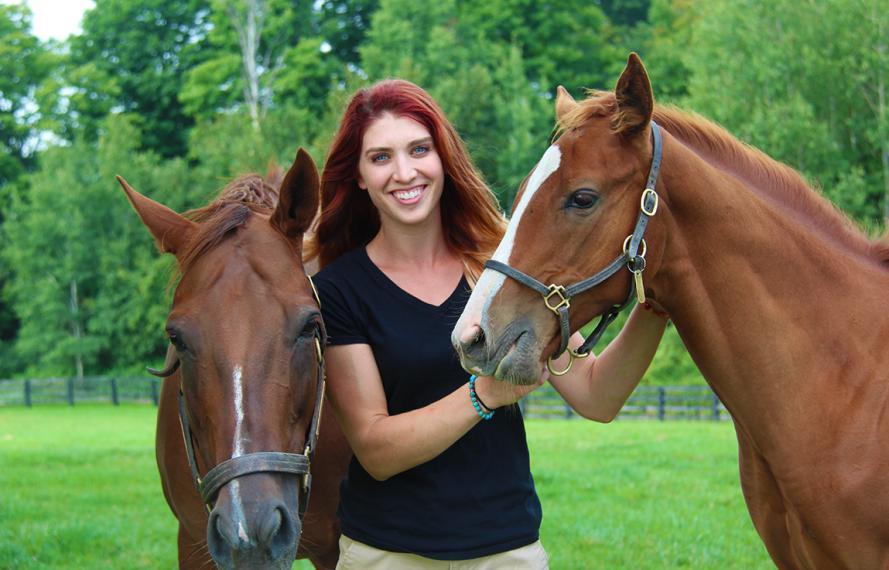Q&A with a stud hand

Shelby Avann
Stud hand
B.B.R.M. - Equine Management 2013
Shelby Avann is a graduate of the equine management major who sat down with us to share her career experiences so far. She currently works at Chiefswood Stables Thoroughbred Breeding Farm, which focuses on foaling and raising fillies and colts for racing. The foals she helps birth go on to race at Woodbine here in Ontario and also in Florida, Kentucky and New York. She’s been in the role for three years, with a year in between working abroad in Australia.
What does a “stud hand” do?
We take care of the horses throughout the day and work on a rotating and variable schedule. We do all the regular stable chores and I am also responsible for helping with foaling. The foaling period is between January and June and at that time I work on birthing mostly. We have about 20 foals each season.. In the past, I’ve done night watch (where you monitor mares who are expected to give birth at night) and I have lived on farm and been on-call to come in if needed.
Why did you pursue a career in reproduction and the thoroughbred industry?
I’ve always really liked biology and anatomy and the idea of working with foals. I found that the thoroughbred industry is where there is stable income, benefits and opportunities for learning. While I was in school, we had a speaker from Woodbine come to one our classes and he told me about the Kentucky Equine Management Internship, which I ended up doing. I saw how the outfits in Kentucky were run, learned a lot and realized this was the industry for me.
What courses in the B.B.R.M. program have been most helpful to you in your career?
The anatomy and physiology course was great. The soils course, although I didn’t like it at the time, ended up being something you needed to know in pasture and operations management. It ended up being very useful. Prof. Peter Physick-Sheard also taught a really great class. He was very particular about being professional and networking. I think professionalism is definitely an important thing to encourage.
What do you enjoy most about your role?
The horses motivate me. I don’t get tired of hanging out with them, especially in foaling season. That is a huge time for learning. Depending on how the birthing is going you learn a lot. With 20 foals born each season you also get to see different aliments, tweaks in body confirmation and how they grow and change over time. That’s the part of my job that is really interesting.
What’s a piece of advice you’d give your younger self?
Network more. Networking and gaining contacts is important. Make sure that you make yourself memorable; you don’t know who might be able to help you later on. If you leave a good impression on people, they may be the people who open doors for you later.
How has networking has helped you in your career?
Networking is important in any industry. It’s a life skill. In my work, it’s good to know people. For example, if something goes wrong, you have a network of people to help find someone that has a nurse mare or colostrum. Networking is also helpful in finding jobs.. That’s how you hear about opportunities and how you move up and grow.
Is that how you had the opportunity to work in Australia?
Yes. I love travelling and I had been wanting to go to Australia for a while. I asked my boss if there was an opportunity for me to go, and he helped me find jobs there with Darley-Woodlands Stud and Mill Park. I like working for my boss a lot; he’s the main reason why I came back to Chiefswood after finishing in Australia. He’s a mentor and he loves teaching people. It’s really easy to work for him, and he’s open to helping me.